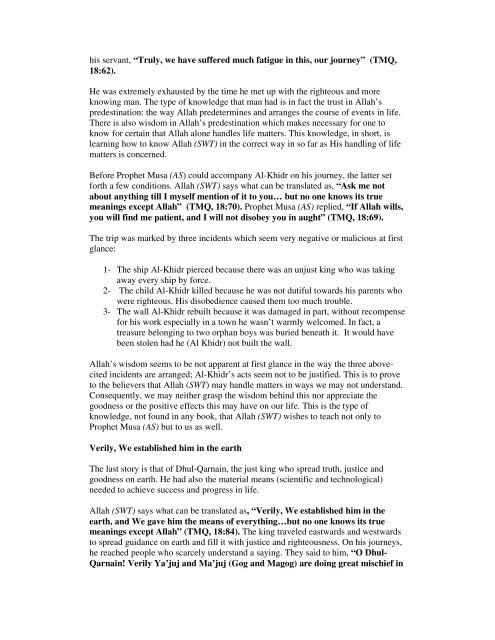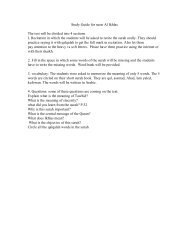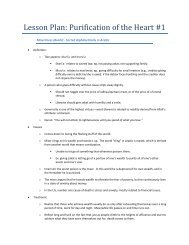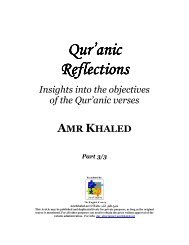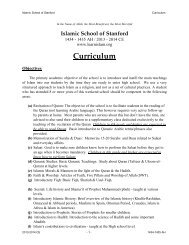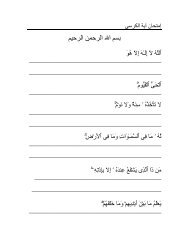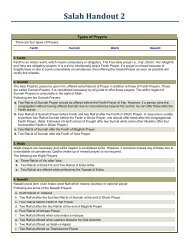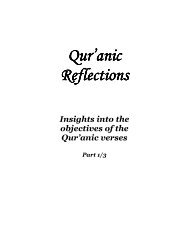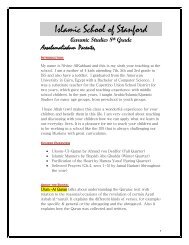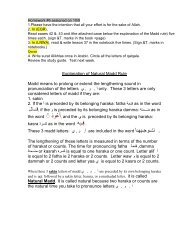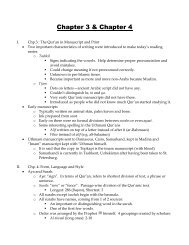Quranic Reflections - Islamic School of Stanford
Quranic Reflections - Islamic School of Stanford
Quranic Reflections - Islamic School of Stanford
You also want an ePaper? Increase the reach of your titles
YUMPU automatically turns print PDFs into web optimized ePapers that Google loves.
his servant, “Truly, we have suffered much fatigue in this, our journey” (TMQ,<br />
18:62).<br />
He was extremely exhausted by the time he met up with the righteous and more<br />
knowing man. The type <strong>of</strong> knowledge that man had is in fact the trust in Allah’s<br />
predestination: the way Allah predetermines and arranges the course <strong>of</strong> events in life.<br />
There is also wisdom in Allah’s predestination which makes necessary for one to<br />
know for certain that Allah alone handles life matters. This knowledge, in short, is<br />
learning how to know Allah (SWT) in the correct way in so far as His handling <strong>of</strong> life<br />
matters is concerned.<br />
Before Prophet Musa (AS) could accompany Al-Khidr on his journey, the latter set<br />
forth a few conditions. Allah (SWT) says what can be translated as, “Ask me not<br />
about anything till I myself mention <strong>of</strong> it to you… but no one knows its true<br />
meanings except Allah” (TMQ, 18:70). Prophet Musa (AS) replied, “If Allah wills,<br />
you will find me patient, and I will not disobey you in aught” (TMQ, 18:69).<br />
The trip was marked by three incidents which seem very negative or malicious at first<br />
glance:<br />
1- The ship Al-Khidr pierced because there was an unjust king who was taking<br />
away every ship by force.<br />
2- The child Al-Khidr killed because he was not dutiful towards his parents who<br />
were righteous. His disobedience caused them too much trouble.<br />
3- The wall Al-Khidr rebuilt because it was damaged in part, without recompense<br />
for his work especially in a town he wasn’t warmly welcomed. In fact, a<br />
treasure belonging to two orphan boys was buried beneath it. It would have<br />
been stolen had he (Al Khidr) not built the wall.<br />
Allah’s wisdom seems to be not apparent at first glance in the way the three abovecited<br />
incidents are arranged; Al-Khidr’s acts seem not to be justified. This is to prove<br />
to the believers that Allah (SWT) may handle matters in ways we may not understand.<br />
Consequently, we may neither grasp the wisdom behind this nor appreciate the<br />
goodness or the positive effects this may have on our life. This is the type <strong>of</strong><br />
knowledge, not found in any book, that Allah (SWT) wishes to teach not only to<br />
Prophet Musa (AS) but to us as well.<br />
Verily, We established him in the earth<br />
The last story is that <strong>of</strong> Dhul-Qarnain, the just king who spread truth, justice and<br />
goodness on earth. He had also the material means (scientific and technological)<br />
needed to achieve success and progress in life.<br />
Allah (SWT) says what can be translated as, “Verily, We established him in the<br />
earth, and We gave him the means <strong>of</strong> everything…but no one knows its true<br />
meanings except Allah” (TMQ, 18:84). The king traveled eastwards and westwards<br />
to spread guidance on earth and fill it with justice and righteousness. On his journeys,<br />
he reached people who scarcely understand a saying. They said to him, “O Dhul-<br />
Qarnain! Verily Ya’juj and Ma’juj (Gog and Magog) are doing great mischief in


